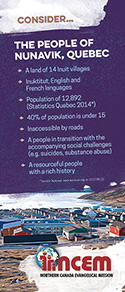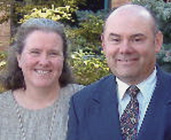by Mark Dana
As missionaries we believe that learning the language and culture of the host people is essential in communicating the Gospel clearly. We’ve found, though, that being a true learner does not mean “adding” knowledge – more often it means starting at zero! It’s like building a new framework on which to place the new knowledge.
“Context” is so important. For example, one of the details of First Nations and Inuit languages I’ve recognized is that the names of the 12 months line up with what is occurring in nature at that particular season.
 So, along with learning the meaning of the various months, I have learned some history of the people’s nomadic lifestyle – when the people were living inland, or other times of the year when they were on the coast, hunting, fishing and gathering.
So, along with learning the meaning of the various months, I have learned some history of the people’s nomadic lifestyle – when the people were living inland, or other times of the year when they were on the coast, hunting, fishing and gathering.
Once, while talking with an Inuit friend, I was told that “August” means the “black berry harvest month.” Having only lived in the south, I envisioned some kind of black fruit that hangs from tree branches or grows on bushes.
Of course, some research could provide photos of this berry. But I really learn about it by participating in picking paungaqutik* (*variations in spelling; also known as “crowberries”). If I was “on the ground,” I would know that there are no trees or bushes in that area of Nunavik!
Living in the Arctic and renovating a house also takes on new meaning. One of our experienced missionaries told us that all supplies (including an accurate estimation of the number of nails and screws needed!) have to be ordered and placed on a ship in the St. Lawrence River by spring. These materials travel out to the Atlantic Ocean, and are shipped up the Labrador coast and down into Hudson’s Bay.
Then there is the weather to consider – the very limited “window” of suitable weather to do exterior work. If you miss the deadlines, nothing can be done on the job for another year.
This year we’re thankful for construction workers who will volunteer at their busiest season to fly north and renovate a house this summer in Puvirnituq, Quebec.
We are very thankful for our NCEM missionaries who have made a long-term commitment to serve in the Arctic. Some of our missionaries, now past retirement age, have returned to the North for visits and to fill-in for our workers on furlough.
We are praying for and seeking younger people to hear the call of the Lord, leave behind family and church fellowship for longer periods of time, and commit themselves to a missionary team outreach.
Investing months/years in language study can be arduous. Learning and loving the community of people for Christ’s glory requires an open heart and mind. Going without the myriad of choices we have as consumers leads us to rely on God for ingenuity in how to repair without the parts, to make a menu with what is on the store shelf, and stretch a budget to meet the high cost of living in the North.
But it’s all worth it when we do it for Christ!
This appeal is also for Christian educators, medical workers, plumbers and other professionals to take on a bi-vocational role and support those in language learning and assisting in the spiritual growth and nurture of the church.
Jesus asks us to pray for workers – please write to NCEM and ask for the new Nunavik prayer card.
Rubbing Shoulders
by Ruth Anna Dana
Usually, when people travel, it is “two-way”– whether it’s on a road, a bridge, or back and forth from an airport.
As NCEM Northeastern-Field Directors traveling in the North to assist missionaries, we have made friends in these communities. Sometimes relationships with these same First Nations and Inuit people are extended when we visit them in hospitals and other institutions in the south. In this “two-way” interaction we are seen not just as visitors from far away, but as real people.
Sometimes our flights with Mission pilot, Allan Giesbrecht, have been grounded due to blizzards further north. We vividly remember, on one of those days, receiving news of the death of two of our good friends who lived on opposite sides of the country.
The local family, who had generously opened their home to us for lodging, also opened their hearts to share in our grief. It was a situation where God used our vulnerability and brought mutual encouragement through His Word and prayer.
The next morning the truck lent to us by this family needed air in a tire. The Lord seems to allow small details like this for His purposes. While dealing with the deflated tire, Mark had a timely face-to-face meeting with the person he’s done business with over long distance phone from the south.
Each of these contacts builds credibility, and greater opportunity to have a mind-set understanding of community life. It is a “rubbing shoulders” way of bridging cultures to share hope through Christ.

 Mark Dana is from the Penobscot Tribe of Maine, USA. He and Ruth Anna have served in the Maritimes and Quebec, mostly among French-speaking First Nations people.
Mark Dana is from the Penobscot Tribe of Maine, USA. He and Ruth Anna have served in the Maritimes and Quebec, mostly among French-speaking First Nations people.
(from Northern Lights issue #535)

